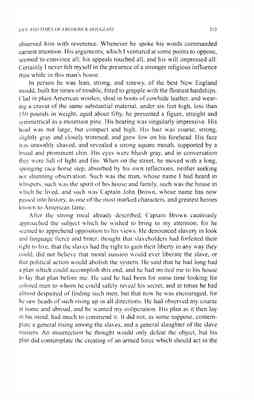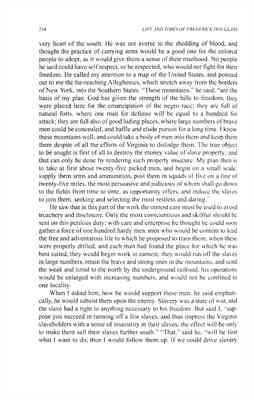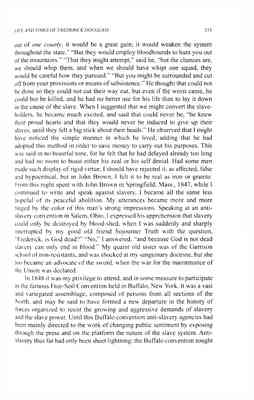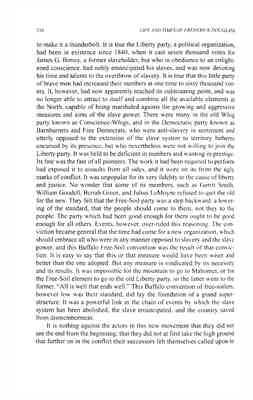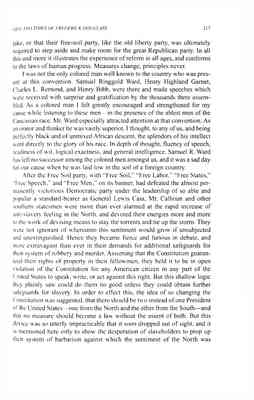Pages
61
LIFE AND TIMES OF FREDERICK DOUGLASS 213
observed him with reverence. Whenever he spoke his words commanded earnest attention. His arguments, which I ventured at some points to oppose, seemed to convince all; his appeals touched all, and his will impressed all. Certainly I never felt myself in the presence of a stronger religious influence than while in this man's house.
In person he was lean, strong, and sinewy, of the best New England mould, built for times of trouble, fitted to grapple with the flintiest hardships. Clad in plain American woolen, shod in boots of cowhide leather, and wearing a cravat of the same substantial material, under six feet high, less than 150 pounds in weight, aged about fifty, he presented a figure, straight and symmetrical as a mountain pine. His bearing was singularly impressive. His head was not large, but compact and high. His hair was coarse, strong, slightly gray and closely trimmed, and grew low on his forehead. His face was smoothly shaved, and revealed a strong square mouth, supported by a broad and prominent chin. His eyes were bluish gray, and in conversation they were full of light and fire. When on the street, he moved with a long, springing race horse step, absorbed by his own reflections, neither seeking nor shunning observation. Such was the man, whose name I had heard in whispers, such was the spirit of his house and family, such was the house in which he lived, and such was Captain John Brown, whose name has now passed into history, as one of the most marked characters, and greatest heroes known to American fame.
After the strong meal already described, Captain Brown cautiously approached the subject which he wished to bring to my attention; for he seemed to apprehend opposition to his views. He denounced slavery in look and language fierce and bitter, thought that slaveholders had forfeited their right to live, that the slaves had the right to gain their liberty in any way they could, did not believe that moral suasion would ever liberate the slave, or that political action would abolish the system. He said that he had long had a plan which could accomplish this end, and he had invited me to his house to lay that plan before me. He said he had been for some time looking for colored men to whom he could safely reveal his secret, and at times he had almost despaired of finding such men, but that now he was encouraged, for he saw heads of such rising up in all directions. He had observed my course at home and abroad, and he wanted my cooperation. His plan as it then lay in his mind, had much to commend it. It did not, as some suppose, contemplate a general rising among the slaves, and a general slaughter of the slave masters. An insurrection he thought would only defeat the object, but his plan did contemplate the creating of an armed force which should act in the
62
214 LIFE AND TIMES OF FREDERICK DOUGLASS
very heart of the south. He was not averse to the shedding of blood, and thought the practice of carrying arms would be a good one for the colored people to adopt, as it would give them a sense of their manhood. No people he said could have self respect, or be respected, who would not fight for their freedom. He called my attention to a map of the United States, and pointed out to me the far-reaching Alleghenies, which stretch away from the borders of New York, into the Southern States. "These mountains." he said. "'are the basis of my plan. God has given the strength of the hills to freedom, they were placed here for the emancipation of the negro race: they are full of natural forts, where one man for defense will be equal to a hundred for attack; they are full also of good hiding places, where large numbers of brave men could be concealed, and baffle and elude pursuit for a long time. I know these mountains well, and could take a body of men into them and keep them there despite of all the efforts of Virginia to dislodge them. The true object to be sought is first of all to destroy the money value of slave property; and that can only be done by rendering such property insecure. My plan then is to take at first about twenty-five picked men, and begin on a small scale; supply them arms and ammunition, post them in squads of five on a line of twenty-five miles, the most persuasive and judicious of whom shall go down to the fields from time to time, as opportunity offers. and induce the slaves to join them, seeking and selecting the most restless and daring."
He saw that in this part of the work the utmost care must be used to avoid treachery and disclosure. Only the most conscientious and skillful should be sent on this perilous duty; with care and enterprise he thought he could soon gather a force of one hundred hardy men, men who would be content to lead the free and adventurous life to which he proposed to train them; when these were properly drilled, and each man had found the place for which he was best suited, they would begin work in earnest; they would run off the slaves in large numbers, retain the brave and strong ones in the mountains, and send the weak and timid to the north by the underground railroad; his operations would be enlarged with increasing numbers, and would not be confined to one locality.
When I asked him, how he would support these men, he said emphatically, he would subsist them upon the enemy. Slavery was a state of war, and the slave had a right to anything necessary to his freedom. But said I, "'suppose you succeed in running off a few slaves, and thus impress the Virginia slaveholders with a sense of insecurity in their slaves, the effect will be only to make them sell their slaves further south." "That," said he, "'will be first what I want to do; then I would follow them up. If we could drive slavery
63
LIFE AND TIMES OF FREDERICK DOUGLASS 215
out of one county, it would be a great gain; it would weaken the system throughout the state." "But they would employ bloodhounds to hunt you out of the mountains." "That they might attempt," said he, "but the chances are, we should whip them, and when we should have whipt one squad, they would be careful how they pursued." "But you might be surrounded and cut off from your provisions or means of subsistence." He thought that could not be done so they could not cut their way out, but even if the worst came, he could but be killed, and he had no better use for his life than to lay it down in the cause of the slave. When I suggested that we might convert the slaveholders, he became much excited, and said that could never be, "he knew their proud hearts and that they would never be induced to give up their slaves, until they felt a big stick about their heads." He observed that I might have noticed the simple manner in which he lived, adding that he had adopted this method in order to save money to carry out his purposes. This was said in no boastful tone, for he felt that he had delayed already too long and had no room to boast either his zeal or his self denial. Had some men made such display of rigid virtue, I should have rejected it, as affected, false and hypocritical, but in John Brown, I felt it to be real as iron or granite. From this night spent with John Brown in Springfield, Mass., 1847, while I cnntinued to write and speak against slavery. I became all the same less hopeful of its peaceful abolition. My utterances became more and more tinged by the color of this man's strong impressions. Speaking at an antislavery convention in Salem, Ohio. I expressed his apprehension that slavery could only be destroyed by blood-shed, when I was suddenly and sharply interrupted by my good old friend Sojourner Truth with the question, "Frederick, is God dead?" "No," I answered, "and because God is not dead slavery can only end in blood." My quaint old sister was of the Garrison school of non-resistants, and was shocked at my sanguinary doctrine, but she too became an advocate of the sword, when the war for the maintenance of the Union was declared.
In 1848 it was my privilege to attend, and in some measure to participate in the famous Free-Soil Convention held in Buffalo, New York. It was a vast and variegated assemblage, composed of persons from all sections of the North, and may be said to have formed a new departure in the history of forces organized to resist the growing and aggressive demands of slavery and the slave power. Until this Buffalo convention anti-slavery agencies had been mainly directed to the work of changing public sentiment by exposing through the press and on the platform the nature of the slave system. Antislavery thus far had only been sheet lightning; the Buffalo convention sought
64
216 LIFE AND TIMES OF FREDERICK DOUGLASS
to make it a thunderbolt. It is true the Liberty party, a political organization, had been in existence since 1840, when it cast seven thousand votes for James G. Birney, a former slaveholder, but who in obedience to an enlightened conscience, had nobly emancipated his slaves, and was now devoting his time and talents to the overthrow of slavery. It is true that this little party of brave men had increased their numbers at one time to sixty thousand voters. It, however, had now apparently reached its culminating point, and was no longer able to attract to itself and combine all the available elements at the North, capable of being marshaled against the growing and aggressive measures and aims of the slave power. There were many in the old Whig party known as Conscience-Whigs, and in the Democratic party known as Bamburners and Free Democrats, who were anti-slavery in sentiment and utterly opposed to the extension of the slave system to territory hitherto uncursed by its presence, but who nevertheless were not willing to join the Liberty party. It was held to be deficient in numbers and wanting in prestige. Its fate was the fate of all pioneers. The work it had been required to perfom had exposed it to assaults from all sides, and it wore on its front the ugly marks of conflict. It was unpopular for its very fidelity to the cause of liberty and justice. No wonder that some of its members. such as Gerrit Smith, William Goodell, Beriah Green, and Julius LeMoyne refused to quit the old for the new. They felt that the Free-Soil party was a step backward, a lowering of the standard, that the people should come to them, not they to the people. The party which had been good enough for them ought to be good enough for all others . Events, however, over-ruled this reasoning. The conviction became general that the time had come for a new organization, which should embrace all who were in any manner opposed to slavery and the slave power, and this Buffalo Free-Soil convention was the result of that conviction. It is easy to say that this or that measure would have been wiser and better than the one adopted. But any measure is vindicated by its necessity and its results. It was impossible for the mountain to go to Mahomet, or for the Free-Soil element to go to the old Liberty party, so the latter went to the former. "All is well that ends well." This Buffalo convention of free-soilers. however low was their standard, did lay the foundation of a grand superstructure. It was a powerful link in the chain of events by which the slave system has been abolished, the slave emancipated, and the country saved from dismemberment.
It is nothing against the actors in this new movement that they did not see the end from the beginning; that they did not at first take the high ground that further on in the conflict their successors felt themselves called upon to
65
LIFE AND TIMES OF FREDERICK DOUGLASS 217
take, or that their free-soil party, like the old liberty party, was ultimately required to step aside and make room for the great Republican party. In all this and more it illustrates the experience of reform in all ages, and conforms to the laws of human progress. Measures change, principles never.
I was not the only colored man well known to the country who was present at this convention. Samuel Ringgold Ward, Henry Highland Garnet, Charles L. Remond, and Henry Bibb, were there and made speeches which were received with surprise and gratification by the thousands there assembled. As a colored man I felt greatly encouraged and strengthened for my cause while listening to these men — in the presence of the ablest men of the Caucasian race. Mr. Ward especially attracted attention at that convention. As an orator and thinker he was vastly superior, I thought, to any of us, and being perfectly black and of unmixed African descent, the splendors of his intellect went directly to the glory of his race. In depth of thought, fluency of speech, readiness of wit, logical exactness, and general intelligence, Samuel R. Ward has left no successor among the colored men amongst us, and it was a sad day for our cause when he was laid low in the soil of a foreign country.
After the Free Soil party, with "Free Soil," "Free Labor," "Free States," "Free Speech," and "Free Men," on its banner, had defeated the almost permanently victorious Democratic party under the leadership of so able and popular a standard-bearer as General Lewis Cass. Mr. Calhoun and other southern statesmen were more than ever alarmed at the rapid increase of anti-slavery feeling in the North, and devoted their energies more and more to the work of devising means to stay the torrents and tie up the storm. They were not ignorant of whereunto this sentiment would grow if unsubjected and unextinguished. Hence they became fierce and furious in debate, and more extrarngant than ever in their demands for additional safeguards for their system of robbery and murder. Assuming that the Constitution guaranteed their rights of property in their fellowmen, they held it to be in open violation of the Constitution for any American citizen in any part of the United States to speak, write, or act against this right. But this shallow logic they plainly saw could do them no good unless they could obtain further safeguards for slavery. In order to effect this, the idea of so changing the Constitution was suggested, that there should be two instead of one President of the United States — one from the North and the other from the South — and that no measure should become a law without the assent of both. But this device was so utterly impracticable that it soon dropped out of sight, and it is mentioned here only to show the desperation of slaveholders to prop up their system of barbarism against which the sentiment of the North was
